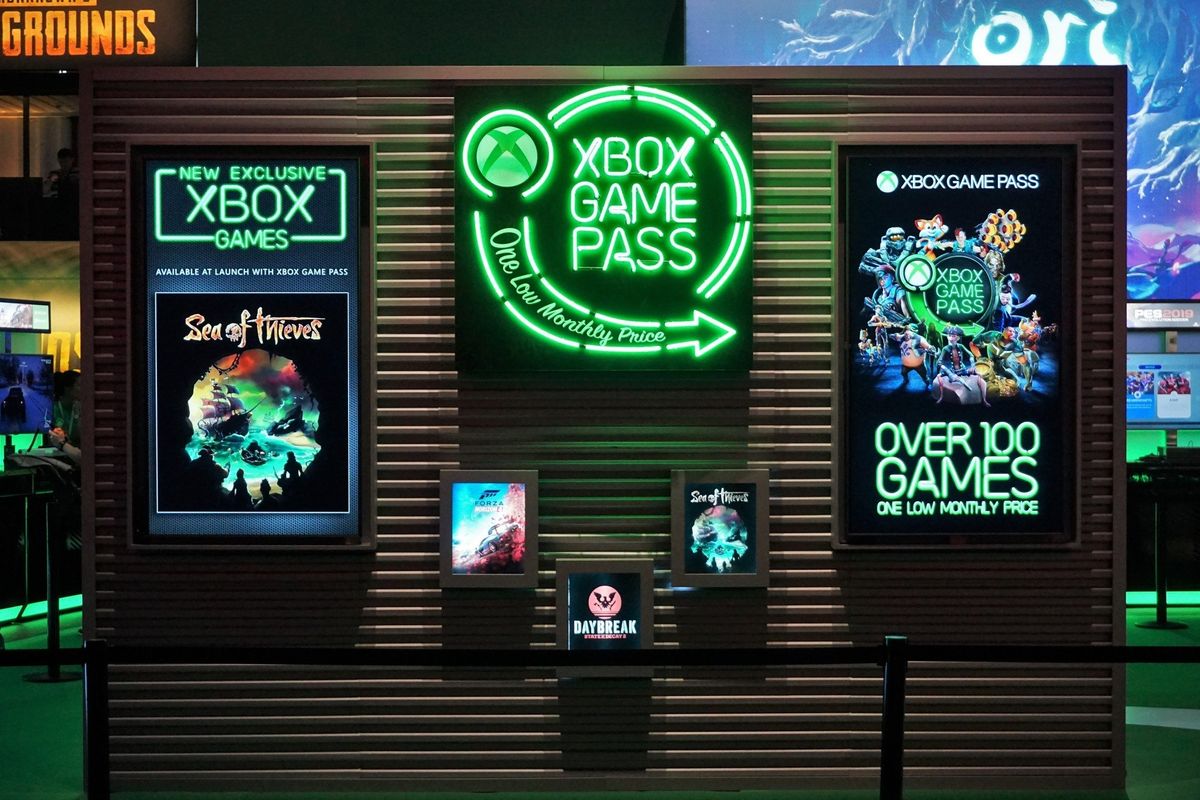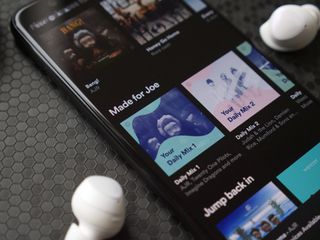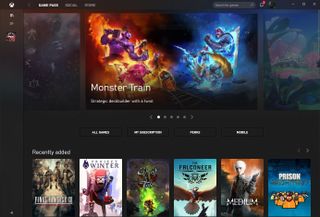Why Xbox Game Pass rightfully rejects the Spotify model
Microsoft's careful design of Xbox Game Pass ensures a winning scenario for all involved.

Spotify has been in the news lately for political reasons, but even before then, the platform has proven to be controversial. Spotify's rise as the de facto method for music distribution has been a rough ride for both the company, and more importantly, its artists.
By design, Spotify's goal is to feature literally every scrap of music ever written, in one vast and gigantic library. Backed early by record labels fearful of music piracy, the effect has certainly had some undesirable consequences, especially for independent musicians and smaller artists. While there are studies that show that piracy has decreased as a result of streaming services like Spotify, the royalty payouts on Spotify are often laughably bad.
You would need to accrue millions upon millions of streams to earn even the most basic living wage on Spotify, and it's made all the more opaque by the fact that Spotify doesn't actually pay a fixed price per stream. You're given a "share" based on the overall streaming throughput on a rolling basis. So, when mega pop stars grab a bigger share due to a viral hit in any particular period, your payout will generally be even lower than usual.
These painful realities in the music business have often been cited in criticism of Xbox Game Pass, where Spotify is used as "doomsday" example scenario to describe where the video game industry could be headed. Xbox Game Pass is different, though, and as long as Microsoft stays the course, the way it has spearheaded what gaming subscription services look like should serve only to benefit devs, rather than hinder them.
The music industry hurt itself in its confusion

The Spotify to Xbox Game Pass comparison has always been a clunky one. People consume music differently than how they consume games, and more importantly, Spotify has tens of millions of tracks, making curation incredibly difficult. Spotify really is an "all-you-can-eat" buffet-type deal, where users sit inside Spotify and are barely upsold any other type of purchase. Some artists offer merch and concert tickets through their Spotify pages, but they're buried right at the bottom of the page. By comparison, Xbox Game Pass is designed as an on-ramp to further spending, as a supplementary system, rather than an exclusory one.
In its panic, the music industry didn't fully consider what would happen if it gave Spotify all of the keys. The music industry aggressively hurt itself and its image, as it funded lawsuits against teenagers for pirating music, and lobbied against version shifting and people ripping their own CDs for personal use. For the sake of artists, they could have and should have, explored ways to improve access to music without cratering exclusivity and value. Alas, the damage has been done. Perhaps it was inevitable, but we may never know for sure.
Either way, the perception of value pop music will never return to what it was in the '90s, for a huge range of factors that are too multitudinous to get into here. The point is that Microsoft is purposefully avoiding what Spotify did to music in the way it's building Xbox Game Pass, to protect developers and creators first and foremost.
Get the Windows Central Newsletter
All the latest news, reviews, and guides for Windows and Xbox diehards.
A highly curated discovery engine with a big upsell

Internal documents that we've seen in the past indicate that Xbox Game Pass subscribers actually spend more money on games, not less, despite the fact the service has hundreds of games available at any one time. It's an important divergence from Spotify and similar all-you-can-eat services, whose libraries are vast, uncurated, comprised entirely of permanent content. Spotify has trained me not to spend more money on music, because I know it'll always be there. Xbox Game Pass is very different.
Microsoft is building up Xbox Game Pass very intentionally to be a supplementary discovery tool, rather than something it hopes will someday replace retail entirely.
Microsoft has a large section across all of its Xbox Game Pass apps that list games "Leaving soon." Indeed, content on Xbox Game Pass rotates on a monthly basis. Games leave the service, and games enter the service, leaving the volume of games quite tightly curated. Furthermore, Microsoft attempts to on ramp customers towards buying those games outright, enticing them with funded discounts. This is a fundamental distinction from Spotify, which places no expectation on users beyond the simple subscribing and grazing into the service.
It could also be argued that gamers feel that through savings on Xbox Game Pass, they have more money to spend on titles or microtransactions that aren't present in the service. It feels to me that Microsoft is building up Xbox Game Pass very intentionally to be a supplementary discovery tool, rather than something it hopes will someday replace retail entirely. Indeed, we've heard that the next step for Xbox Cloud Gaming is the ability to let you buy games to stream into the service, which will further increase access to games at retail.
Game Pass really made me appreciate indie games more than ever before. I discovered some real gems these last couple of years, and I think the honest reality is that I likely wouldn't have checked many of them out without being included in the service. pic.twitter.com/qYMZ3LIJBfGame Pass really made me appreciate indie games more than ever before. I discovered some real gems these last couple of years, and I think the honest reality is that I likely wouldn't have checked many of them out without being included in the service. pic.twitter.com/qYMZ3LIJBf— Klobrille (@klobrille) February 3, 2022February 3, 2022
For the biggest players, Spotify does pay out a flat fee to acquire content. It famously paid Joe Rogan tens of millions for exclusivity on his podcast shows, before royalties. For indie musicians, it's often been the case that they have to pay to get their music onto Spotify in the first place, going through a record label or publisher, who take a cut of your profits for the mere privilege of existing. Microsoft's ID@Xbox self-publishing label allows developers who meet certain criteria to submit their games directly to Xbox platforms, and they pay a flat upfront fee for every game that hits Xbox Game Pass, as well as engagement bonuses for titles that do remarkably well in the service. Game developers know upfront what they will get for joining Xbox Game Pass, which includes word-of-mouth virality, marketing beats across Microsoft's socials, and news posts across media (like this one, for this month's Xbox Game Pass games).
By keeping Xbox Game Pass' library of content tightly knit, it allows games that otherwise wouldn't have had much of a marketing presence to shine in a busy crowd. I've discovered (and purchased) mountains of indie games that I likely never would have previously, had it not been for Xbox Game Pass, and I find myself experimenting in new genres I haven't before. The same is true for Spotify, but unlike Spotify, there's no incentive or even a reminder that CDs and vinyl exist for a lot of the music I'm listening to on the service.
I do own hundreds of CDs and dozens of vinyl records, but of course, Spotify would prefer I didn't buy them at all. And that's because ultimately, it hurts them since it has no retail distribution platform of its own. By contrast, Xbox doesn't want to kill its games retail business, and it seems acutely aware of the damage an oversaturated service can do.
Xbox Game Pass is good

There's no denying that Xbox Game Pass is great value for its subscribers, providing thousands of dollars in potential savings per year, and featuring some of the best games on Xbox. But for the health of the industry, it's absolutely paramount that Microsoft continues to be careful about the way it curates and grows the service. Too much content, and it'll be hard for smaller titles to get noticed, too little content, and people may begin to unsubscribe. It's a tough balancing act, and a difficult task I'm glad doesn't rest on my shoulders. Still, it seems that Microsoft's efforts are paying off.
The music streaming industry is not an example of where Xbox Game Pass is heading. It is in fact an example of what Microsoft is actively fighting to avoid.
With Microsoft aggressively framing the system this way, other companies will have to follow its model. Under Xbox Game Pass, games retain some degree of exclusivity and prestige, as opposed to the all-you-can-eat saturation seen in Spotify. Microsoft's first-party permanent exclusives will do the heavy lifting to bring in new users to the service, with smaller titles offered the chance to shine outside of the bigger marketing cycles.
Independent developers are arguably driving the lion's share of innovation in this business, and it's crucial that the big players like Microsoft work hard to nurture that skill and talent regardless of the size of the dev.
Simply put, the music streaming industry is not an example of where Xbox Game Pass is heading. It is in fact an example of what Microsoft is actively fighting to avoid.

Jez Corden is the Executive Editor at Windows Central, focusing primarily on all things Xbox and gaming. Jez is known for breaking exclusive news and analysis as relates to the Microsoft ecosystem while being powered by tea. Follow on Twitter (X) and Threads, and listen to his XB2 Podcast, all about, you guessed it, Xbox!